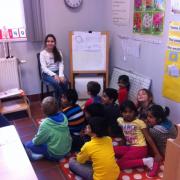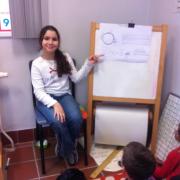Every Monday we start up the new week with looking at the new weekly focus in Numeracy. This week we are learning how to organise and read data. We are learning about tally charts, frequency tables, pictograms, bar graphs, bar line graphs and grouped data. There are different learning targets for the different year groups, and all pupils are working hard with their weekly assignment.
We also look at the weekly spelling focus. All Upper Primary pupils work through a worksheet to understand and recognise the spelling rule, before homework is handed out on Wednesday.
We work with Literacy in different ways. Every week we read a book or text together with a teacher and then work with follow-up questions or write a short summary. We practice grammar and vocabulary, both by working in our books and every time we write with a special focus. We have been reading, answering questions and writing about the things we learn in IPC the last few weeks, but we also know that we can share our learning and knowledge in other ways.
The learning targets are important when we work with IPC. Some of these learning targets are:
- Children will be able to carry out simple investigations.
- They will be able to test ideas using evidence from observation and measurement.
- They will be able to use evidence to draw conclusions.
- They will be able to record and communicate their observations and findings in a variety of ways.
- They will be able to explain their observations and findings...

 Besma shared her 'eye-reseach' with the pupils in Lower Primary. They listened with great interest and asked many questions about the eye and how the eye works! A presentation is a great way to share knowledge, but also to make it clear to yourself how much you actually know about something. Besma did a good job!
Besma shared her 'eye-reseach' with the pupils in Lower Primary. They listened with great interest and asked many questions about the eye and how the eye works! A presentation is a great way to share knowledge, but also to make it clear to yourself how much you actually know about something. Besma did a good job!
After our lesson about the ear and how the ear works, Emma wanted to share a game on her Nintendo with us. She said that it had to do with our learning. During the lesson we drew and labelled the different parts of the ear. To understand how the ear works, we also needed to understand what sound is. We read a text and we saw a short movie about soundwaves. Emma brought her game the day after that lesson and showed us that we could see soundwaves... It was a great opportunity to make lots of noise, just to see the soundwave meter move. Soft sounds and loud screams looked completely different on the meter. Thank you, Emma!
We co-operated during the IPC lesson where our focus was the digestive system. We worked in groups and tried to show how food moves through the body and then out again. We had just had lunch, so it was easy to imagine the food traveling through the body while we talked. We then checked our work by watching a short movie and reading about the digestive system. After that it was time to look at our drawing again and make necessary changes. There were many things to think about, the food travels a long way through our body and many important organs work together to digest the food we eat.
Did you know that a grown-up's small intestine is 6,7 meters? We cut a piece of string this long, just to understand what 6,7 meters mean. That was a looooong piece of string! You can check this at home, if you don't believe us!
Vedant, Diba, Emma and Bobette worked hard to add organs that they had forgotten to draw. Rotem, Nothrathcha and Kaaru had to fix a few things to make the digestive system look OK, but we were really impressed when they shared the result. Well done, all Upper Primary pupils!
We have learned more about the digestive system today, how the food brings nutrients into our blood and how nutrient-rich blood is pumped to every part of our body. We discussed the homework from last week, where we tried to find out what a 'healthy diet' means. We also discussed how exercise can help the digestive system. We agreed that a healthy diet is good, that we should eat less unhealthy things and exercise to stay healthy!
We then talked about how the blood is pumped through the body and we talked about the ever so important heart. We checked our heart rates and saw that there was a difference between the heart rate when we are resting and when we are exercising. It was tricky for some of us to measure the pulse and some of the results were not reliable, but when we looked at the results from all the pupils in the group, we could see that the heart beats faster and pumps more blood to increase the supply of nutrients and oxygen to our body when we exercise.
We exercised for 3 minutes and then we recorded the result. 6 minutes after exercise, the heart rate was not yet back to normal. Our hearts had been working hard during our exercise!
We now will use Wednesday to rest, eat helthy and do lots of sports activites, so that we can come back to school on Thursday again -- full of energy!

